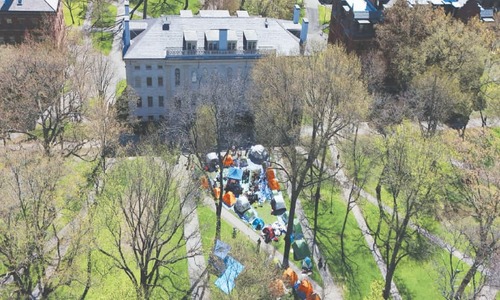JIFTLIK: Palestinian farmer Talib Edais looked longingly at the hills where his herd used to graze for free as he fed his sheep expensive grain. This was prior to a decision made by Israel last month.
See these dips, too? To feed the others, we had to sell some of the sheep. We won’t have any sheep left in a year, the 65-year-old told reporters at his farm in the occupied West Bank’s Jiftlik hamlet, which is close to the Jordan Valley.
In March, Israeli officials annexed 800 hectares, or 8,000 dunams, as state property. The disputed land is next to Edais’s house and contains the grazing areas for his sheep. Palestinians’ access to the lands is frequently restricted as a result of these actions.
Since 1967, Israel has been in possession of the West Bank, built settlements that are forbidden by international law, and has been stealing land from the Palestinians for many years.
Peace Now, an Israeli watchdog group on settlements, claims that this year has already surpassed previous records for the number of “land grabs,” which frequently result in the growth of settlements.
The advocacy group disclosed that Israel has taken possession of 10,971 dunams of land in the occupied West Bank so far this year. This has happened while the world has been preoccupied with the horrific Israeli attack on the Gaza Strip, which started on October 7. Peace Now claims that the previous annual record was 5,200 dunams taken in 1999.
An place becomes the property of the Israeli government when it is designated as state land. In theory, this shouldn’t have an impact on farming or other land uses until the lot is either given to private owners or redistributed for development.
Nonetheless, Peace Now discovered in 2018 that “Israeli settlement needs accounted for 99.76 percent of state land allocated for any use in the occupied West Bank.”
The farmer can see an Israeli army base and the adjoining town of Masua from the land near the Jordanian border where he and fifty of his relatives have lived since 1976. He claimed that Israelis “captured” his sheep and claimed they had entered a “off-limits area” before the Israeli decision to acquire the land had even gone into effect.
His family was forced to pay the Jordan Valley Regional Council 150,000 shekels, or roughly $39,500, in order to get them back. This is the governing body for roughly twenty communities, including Masua.
The rising adoption of such strategies, which rights groups claim are “encouraging” Palestinian relocation from lands desired by settlers, has drawn criticism.
Reporters repeatedly asked for comments, but the Israeli Defense Ministry organization in charge of Palestinian civil affairs, COGAT, and the office in charge of state lands did not reply.
A 55-year-old Jiftlik resident and construction worker named Hamad Audi told reporters that Edais’s fate was “no surprise.” “The state (Israel) stands with the settlers, and the law is in their hands,” Audi declared.
He claims that Israeli authorities had “handed” demolition notices to many of the village’s homes, with one already demolished.
A state-owned archaeological site, 206 dunams (51 acres) adjoining Jiftlik were declared in March and given to the Jordan Valley settlement council.
The location is a rocky mound that once housed an Ottoman-era structure and a prison during the British Mandate. Palestinians who live close to it can no longer access it.
Two million Palestinians and 490,000 Israeli settlers coexist in the West Bank. Yonatan Mizrahi, director of Peace Now’s settlement monitor, stated that “in the last year we’ve seen a lot of developments” despite the fact that settlements have continuously grown throughout Israeli administrations.
Including MPs that advocate for the annexation of the West Bank and extreme-right parties that back settlement growth, Israel’s government was established less than a year prior to the start of the Gaza crisis.
According to Audi, Palestinian lives are under jeopardy there.He declared, “I anticipate that everyone living in the Jordan Valley region will be displaced.”
As a buffer zone between the West Bank and Jordan, the Jordan Valley is considered by many Israelis to “be in Israeli hands no matter what,” according to Mizrahi. It is significant to remember that in 1994, Israel and Jordan drafted a peace agreement.
Many of the Palestinian towns in the Jordan Valley are centered on farming, and Mizarhi continued, “they have very little power.”








